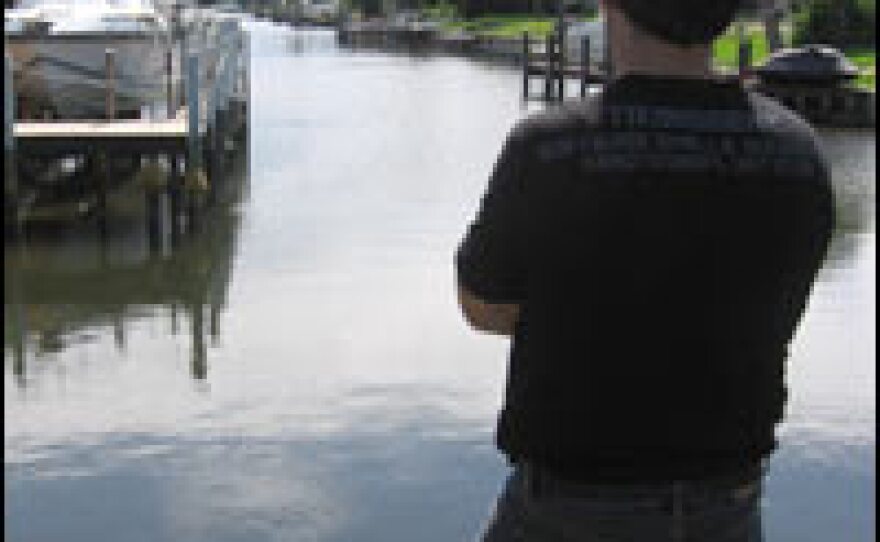
On his laptop computer, 27-year-old Bahjat keeps photos of when he worked with an American contractor in Baghdad, including one of him and his colleagues lined up in matching bulletproof vests. Bahjat was an IT specialist, and he says that, just like U.S. soldiers, Iraqis who worked with Americans took their lives in their hands simply by showing up every day.
"Our guys were going to one of the meetings and got hit by a bomb," he says. "One of the guys, somebody kidnapped him and killed him. It was very bad."
Last year, Bahjat, his mother and his sister received refugee status, admitted through a special program to resettle Iraqi translators and others who have helped American interests in that country. The program has been plagued by delays and is far from its goal of resettling 12,000 Iraqis this fiscal year. Bahjat doesn't want to use his full name because he fears for the safety of a brother also working for an American contractor in Baghdad.
Today, the three family members live in a small ranch house in the resort-retirement community of Cape Coral, Fla. While in Iraq, Bahjat had befriended an American contractor from Cape Coral, and put the man as a contact on his refugee application. The place could not be a starker contrast to life in Baghdad. Off the backyard is a canal leading to the Gulf of Mexico; Bahjat is the only one without a boat tied to a dock. But despite the sun and sand, he has decided that he's in the wrong place to build a new life.
"If you don't have enough money to survive," he says, "it will not be heaven — it will be hell."
Bahjat was hoping his experience — and engineering degree — would make him valuable here, maybe let him help the U.S. with its war on terrorism. Instead, after five months of cold-calling on stores and trawling job-search sites, he has received just one job offer, from a local hotel.
"We thought that the job position would be like warehouse manager or warehouse assistant," he says. "When I went there, it was a cleaner, or room keeper. I felt very disappointed."
Bahjat says he would have accepted it if he thought his family could have survived on the earnings, but at $7 an hour, he turned it down.
As we speak, his sister calls from Jordan. She, too, worked for Americans in Baghdad, as an administrator at Alhurrah, the U.S.-funded Arabic-language television channel. Now she has fled Iraq with her husband and child, seeking refugee status to come to the U.S. as well. Bahjat's mother sobs on the phone as she asks after aunts, uncles and her grandchildren.
Bahjat says that while he's grateful to be living in a safe place, and knows the economy is bad right now even for Americans, he can't help feeling let down as employers keep rejecting his job applications.
"I don't blame them if they don't respect my degree and my experience, but at the same time they should know that I served this country," he says. "Me and my family, my brother and my sister, we served this country more than many Americans did."
Bahjat's frustrations are typical of many Iraqi refugees, says Jane Leu, executive director of the nonprofit group Upwardly Global. The State Department asked the group to help out, essentially admitting that there is not much the government can do for these Iraqis.
Leu has organized weekly conference calls to coach several dozen Iraqis on how to navigate the U.S. job market, and help them learn the very American trait of marketing oneself. If nothing else, Leu says she hopes to provide some small measure of validation.
"They feel like they were brought here on some promise or expectation that the American people or the American government would help them," she says. "So, in many cases, just that one-hour phone call is a validation that we are following through on that promise."
In Northern Virginia, 31-year-old Salman has been jobless for nearly three months. In Baghdad, he worked in public affairs for the U.S. Army, then the U.S. Embassy; he also prefers not to use his full name to protect family in Baghdad. Iraqis often keep their presence in the U.S. a secret from even friends, fearing that if word got out it would only confirm the suspicions of some that those who worked with Americans were traitors or spies.
Here in the U.S., he landed a part-time job in the stockroom of a Barnes and Noble, but lost it because the government was slow with his paperwork. On a sidewalk bench, Salman sticks his cold, gloveless hands in his coat pockets, and says life in the U.S. is not what he expected.
"I was expecting more," he says. "I still remember the sentence of the first American officer that I met in Iraq in 2003, which is, 'Working with the American government is a future.' And I believed what he said."
Shortly after he arrived, Salman says he got a phone call from another Iraqi who had given up after three months of struggle. He was leaving his family in the U.S. to take a contract job back in Iraq.
"Because, he said, 'I have nothing.' And he has a wife and child, and he needs to support them." When asked whether he would ever do the same, Salman says, "This is a hard question because lately I've seen just frustration and frustration."
Most Iraqis are coming to the U.S. as refugees, with several months of federal assistance for rent and food. But about 1,000 — including Salman — have come on Special Immigrant Visas that offer no aid. Salman has been staying in the guest room of his former American boss. He says she's extremely kind, and has even loaned him money, but he wonders how long he can keep imposing.
Back in Florida, Bahjat's rent and food aid will soon run out, and he has had to start paying back the government for the family's plane tickets here: $3,000, in monthly installments. Meanwhile, American contractors are making offers for Bahjat to return to Iraq, and he says it's making him crazy. He also knows an Iraqi who went back, but Bahjat remembers the death threats he faced there, and the roadside bomb that ripped into his own car and killed a friend.
"I think that I was lucky the first time, when I survived and came here from a battlefield. And now they want to send me back there. It's something very bad, but if I have to do it, I'll do it."
Copyright 2022 NPR. To see more, visit https://www.npr.org. 9(MDAzMjM2NDYzMDEyMzc1Njk5NjAxNzY3OQ001))






